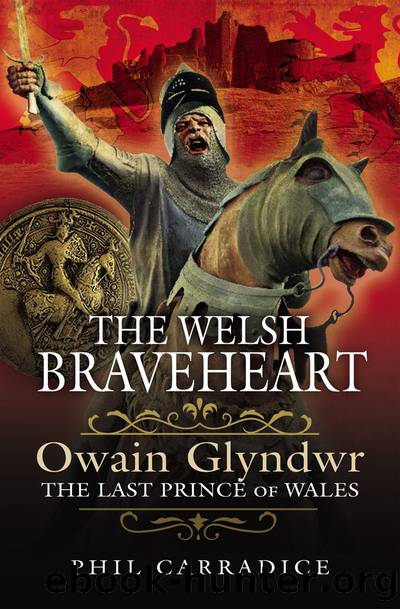The Welsh Braveheart by Phil Carradice

Author:Phil Carradice
Language: eng
Format: epub, pdf
Tags: BIOGRAPHY & AUTOBIOGRAPHY / Royalty
Publisher: Pen and Sword
Published: 2022-04-29T00:00:00+00:00
*****
In May 1404, after months of siege and almost continuous assault, the castles of Harlech and Aberystwyth were eventually taken by Owain Glyndwr. Despite repeated attempts, the Welsh besiegers had failed to batter their way into Harlech, which, regardless of everything Glyndwr threw at it, stood proud and defiant on its sea-girt rock. And so Glyndwr reverted to the well-tried tactics of old â he would starve out the defenders.
It was a long, slow process which many of the besieging soldiers felt could be ended by a swift assault. Glyndwr stuck to his policy of besieging the castle. It was only when disease broke out, decimating the defenders and taking away their will to fight on, that the castle finally surrendered. Glyndwr promptly took possession, made the place his âseatâ and installed his family inside the fortress walls.
Aberystwyth Castle was taken at about the same time. The exact date, like so much else from the period, is unknown. Despite its picturesque position and superb views out over the sea, Aberystwyth Castle had always been vulnerable to attack. If he was going to hold the place â and it seemed that he was â Glyndwr would have to make modifications and fill the castle with a strong garrison.
Unlike his other conquests, Owain Glyndwr had every intention of holding on to Harlech and Aberystwyth. They would become symbols of Welsh resistance and were fortresses worthy of any man in his position.
Harlech quickly came to be regarded as the capital of the new Wales. There Glyndwr established his court and for a few short months was able to pose and parade around like a king before his courtiers and visiting dignitaries. The castle rooms and galleries were furnished to a high level with wall coverings and paintings, all chosen to reflect Glyndwrâs rise to glory. Poets and story tellers, churchmen and pilgrims wandered the corridors while envoys from countries as diverse as France and Spain gave Harlech Castle an exotic and romantic feel. Feasts and jousting tournaments were held in the castle grounds, mirroring the stories from legend, stories that the bards were happy to repeat again and again.
No longer could Chroniclers like Adan of Usk sneer at the âmiserable Welshâ who conducted such low, despicable sneak attacks before running back to their caves in the woods. Now Wales had a monarch, a man to be proud of, a man who had fought and beaten the English. All it now needed for this picture to be complete was a parliament: âOwen and his hill men, even in their misery, at Machynlleth, usurping the right of conquest, and other marks of royalty, albeit to his own confusion, held or counterfeited or made pretence of holding parliaments.â2
With his position now more secure than it ever had been Owain Glyndwr set about organising the apparatus of government. It was the right move at the right time and clearly showed the Welsh leader as someone who was considerably more than a simple guerrilla fighter.
In July 1404, he called four men from each commote of Wales to meet with him in a parliament at Machynlleth.
Download
This site does not store any files on its server. We only index and link to content provided by other sites. Please contact the content providers to delete copyright contents if any and email us, we'll remove relevant links or contents immediately.
| General | Channel Islands |
| England | Northern Ireland |
| Scotland | Wales |
Room 212 by Kate Stewart(4117)
The Crown by Robert Lacey(4117)
Endurance: Shackleton's Incredible Voyage by Alfred Lansing(3856)
The Iron Duke by The Iron Duke(3653)
The Rape of Nanking by Iris Chang(3529)
Killing England by Bill O'Reilly(3465)
Joan of Arc by Mary Gordon(3271)
Say Nothing by Patrick Radden Keefe(3071)
I'll Give You the Sun by Jandy Nelson(2849)
Hitler's Monsters by Eric Kurlander(2740)
Shadow of Night by Deborah Harkness(2739)
Margaret Thatcher: The Autobiography by Thatcher Margaret(2691)
Mary, Queen of Scots, and the Murder of Lord Darnley by Alison Weir(2683)
Darkest Hour by Anthony McCarten(2654)
Blood and Sand by Alex Von Tunzelmann(2614)
Red Famine: Stalin's War on Ukraine by Anne Applebaum(2472)
Eleanor & Park by Rainbow Rowell(2401)
The One Memory of Flora Banks by Emily Barr(2354)
Book of Life by Deborah Harkness(2279)
